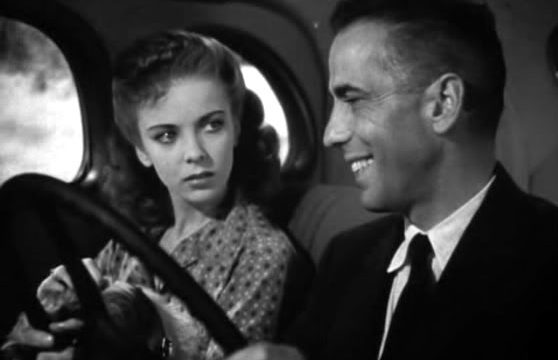It’s interesting to think of someone who goes into acting to appease a demanding parent. On the other hand, the story of a child forced into the family business is not new. And when you can trace your family business to the refugee son of a puppetmaker in the seventeenth century, that’s some pressure. So instead of going into writing as she wanted, Ida Lupino became an actress. Which she then used as a springboard into writing and directing.
She was initially considered basically the poor man’s Bette Davis. In fact, she repeatedly went on suspension rather than take roles that Bette Davis had rejected. She wrote her first play at seven. She enrolled at the Royal Academy of Dramatic Arts at thirteen. Somehow, she ended up playing a lot of prostitutes, then ended up in Hollywood playing innocent girls. Her film career was uneven and didn’t really settle until the rise of noir.
And of course, she directed. She took the time she spent under suspension to study the craft of filmmaking. The first film she directed was Not Wanted, which she took over after official director Elmer Clifton had a heart attack. She did not take credit, but she did on six other movies and dozens of TV episodes. She was probably one of the hardest-working female directors in Hollywood; she may still be one of the hardest-working female directors in Hollywood history.
She didn’t consider herself a feminist. She was willing to pretend to know less than she did in order to get men to do what she wanted them to. On the other hand, she also believed that more women deserved the chance to do what she did, and her films tend to present men as the forces of destruction and irrationality that women are in many more traditional noir films. It is, to me, probably at least in part the pernicious influence of how “feminism” is seen as a bad word, a bad thing to be. She couldn’t be feminist, because feminism is pushy, and a pushy woman is a bad woman. But she had to be at least a little pushy in order to get anything at all done.
It’s complicated; women’s history in film is complicated. We should also see her as more of a pioneer of poverty filmmaking than I think we do. She used some of the same techniques as Ed Wood, albeit with considerably more talent than Ed Wood had. No one in a Lupino film would ever attempt to force her to do a second take, anyway; she got the performances she wanted. The life she wanted? Who can say? But I think she got closer to the life she wanted in the end than she may have thought she was going to get by trying to make her father happy.

